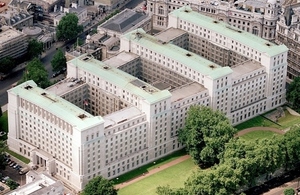Analysis supports the formulation of defence policy
Dstl's analysis fundamentally shaped the Strategic Defence and Security Review 2015, ensuring a robust defence policy for Her Majesty’s Government.

Ministry of Defence
Dstl’s Defence and Security Analysis Division provides a wide range of policy analysis to support the Ministry of Defence (MOD) and partners across government. Over the course of 18 months during 2014 and 2015, embedded analysts supported the Strategic Defence and Security Review (SDSR). They developed a framework to help senior decision makers in MOD understand the policy choices confronting Defence. The result was the ‘New Framework for Defence’ and ultimately the current National Security Objectives.
The framework played an important presentational role during SDSR. In their public speeches, both the Defence Secretary and the Chief of Defence Staff cited the New Framework for Defence as “helping us maintain our operational and technological edge, recruit and retain the best people and forge stronger international partnerships”.
Within Whitehall, MOD used the framework to show the direction of thinking, and the Cabinet Office saw the presentational benefits of the framework and adopted a modified version as the current National Security Objectives.
The original goal was to compare alternative posture choices, and to investigate their comparative policy, force structure, and resource implications. To this end, Dstl ran a SDSR strategic game for senior personnel. At each stage of an unfolding global scenario, participants were asked to consider the freedom of action, constraints, and political implications of changing the UK’s overall defence posture. The insights informed the Defence Strategy Group’s deliberations in the closing stages of the SDSR.
The strategic game sparked a wider interest in wargaming among senior decision makers in MOD. The result was Vice Chief of Defence Staff’s wargaming initiative and a Dstl-designed a senior ‘modern deterrence’ wargame in September 2017, with more planned for the future.
For more information, contact centralenquiries@dstl.gov.uk.